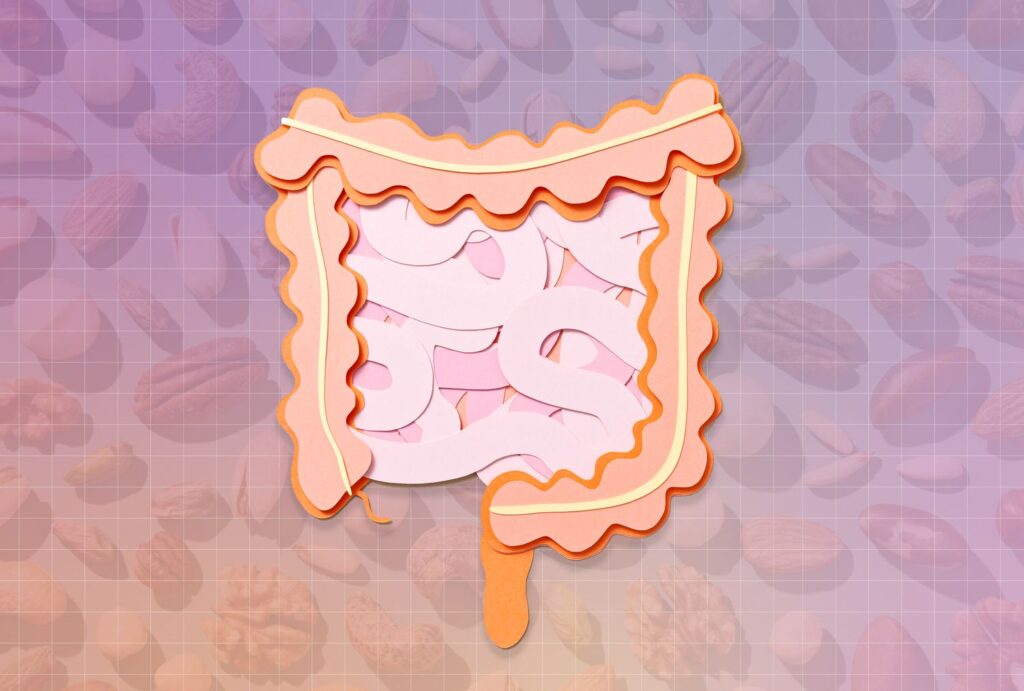- Omega-3 fatty acids reduce gut inflammation and support the growth of good bacteria.
- Salmon, soybeans, tuna and seeds like chia, flax and hemp are all good sources of omega-3 fatty acids.
- Managing stress, eating a variety of plant-based foods and fermented foods also support your gut.
Fiber tends to steal the limelight when it comes to gut-supporting nutrients, but there’s another nutrient that’s a bit of an unsung hero in the gut health world: omega-3 polyunsaturated fatty acids (aka PUFAs). These healthy fats help nurture a diverse and balanced gut microbiome. You’ll find them in foods like salmon, tuna, sardines, walnuts, soybeans and a range of seeds including hemp, flax seeds chia.
“PUFAs, especially omega-3s, support a healthier gut microbiome by promoting beneficial bacteria and reducing inflammation in the intestinal lining,” says Kaytee Hadley, M.S., RDN.
Keep reading for more on how omega-3s influence your gut and some science-backed tips for supporting a healthy gut.
Why Dietitians Love Omega-3s for Gut Health
They Support the Gut Barrier
“Eating foods rich in omega-3s has been shown in human studies to improve the integrity of the gut lining, which is important for inflammation, metabolic health and improving certain gut-related symptoms,” Hadley says.,
This is important because when the gut barrier is compromised, it’s easier for “bad” bacteria to cross over and trigger inflammation, explains Amanda Sauceda, M.S., RD. Inflammation can interfere with healthy digestion.
They Support Healthy Gut Bacteria
Eating omega-3s can help support a healthy gut microbiome by encouraging the growth of beneficial bacteria, Hadley says. In turn, these microbes, when fed dietary fiber, produce compounds like short-chain fatty acids that nourish the gut lining and reduce inflammation. By promoting a more balanced microbiome, omega-3s can support overall digestive health.,
“The more diverse your gut microbes are, the healthier your gut tends to be,” says Kim Kulp, RDN.
They May Reduce Gut Inflammation
Omega-3s may also calm inflammation in the digestive tract, research shows. [7] By reducing levels of pro-inflammatory molecules such as cytokines, omega-3s can support gut functioning and ease inflammation in the intestinal lining.
Foods Rich In Omega-3s Often Contain Other Nutrients That Support The Gut
Foods high in omega-3s also have other properties and nutrients that benefit gut health. For example, flax and chia seeds are loaded with fiber, which supports a healthy microbiome.
“We don’t eat nutrients in isolation, we eat food,” Sauceda says.
Other Strategies to Support Your Gut Health
- Eat more plants. “The best way to support gut health is by eating a variety of plant foods,” Kulp says. “Fruits, vegetables, nuts and seeds, and legumes all provide the needed mixture of fibers and prebiotics [that] fuel beneficial microbes.” Hadley suggests aiming to eat at least 30 different plants each week to feed healthy gut microbes, get enough fiber and reduce inflammation.
- Don’t forget about fermented foods. Foods like yogurt, kefir, sauerkraut, kimchi and kombucha are all rich in natural probiotics that support the gut microbiome and may also reduce inflammation, Hadley says.
- Try a new recipe each week. “Because variety is so important for gut health we need to get creative in the kitchen,” Sauceda says. “Trying out new recipes helps translate nutrition advice into something actionable.”
- Experiment with different types of fiber. Fiber offers endless gut health benefits, from keeping you regular to helping you feel full. Different plant-based foods provide different types of fiber and support your gut and overall health in different ways. “While avocado and chia seeds are almost always in my kitchen, I make an effort to switch things up so that I keep up with variety,” Sauceda says. “Hemp seeds and flax seeds are some other fiber foods with healthy fats that I also like to recommend.”
- Support your mental health. Find ways to manage stress, whether it’s speaking to a therapist, going for a run, having a slow morning at home or sitting down to meditate. “There is a strong connection between the mind and the gut, which means how you feel mentally can impact you physically,” Sauceda says. “Stress is going to happen—that’s just life, but we can work on ways in which we can cope better.”
Our Expert Take
If you’re looking to support your gut health, carve out some space on your plate for omega-3-rich foods like fatty fish, walnuts and chia seeds. These healthy fats help reduce gut inflammation, support the growth of beneficial bacteria, and strengthen the intestinal barrier. A great complement to fiber, they work best as part of a varied diet full of plant-based foods that feed and support a healthy gut microbiome.

